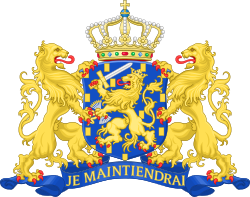Mackay cabinet | |
|---|---|
| Cabinet of the Netherlands | |
| Date formed | 21 April 1888 |
| Date dissolved | 21 August 1891 (Demissionary from 9 July 1891) |
| People and organisations | |
| Head of state | King William III (1888–1890) Queen Wilhelmina (1890–1891) |
| Head of government | Aeneas Mackay |
| No. of ministers | 8 |
| Ministers removed | 2 |
| Total no. of members | 10 |
| Member party | Anti-Revolutionary Party Independent Catholics Independent Protestants |
| Status in legislature | Centre-right Majority government |
| History | |
| Election | 1888 election |
| Outgoing election | 1891 election |
| Legislature terms | 1888–1891 |
| Incoming formation | 1888 |
| Outgoing formation | 1891 |
| Predecessor | J. Heemskerk cabinet |
| Successor | Van Tienhoven cabinet |
| Part of the Politics series |
 |
|---|
| |
The Mackay cabinet was the cabinet of the Netherlands from 21 April 1888 until 21 August 1891. The cabinet was formed by the Anti-Revolutionary Party (ARP), Independent Catholics (Ind. C.) and Independent Protestants (Ind. P.) after the election of 1888. The centre-right cabinet was a majority government in the House of Representatives. Aeneas Mackay of the Anti-Revolutionary Party was Prime Minister.









